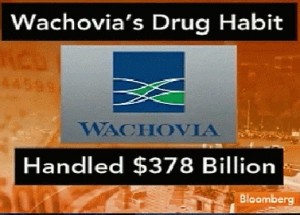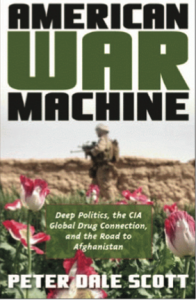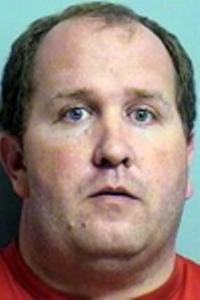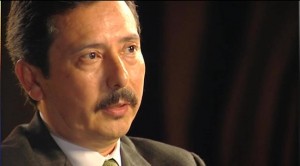How Can We Stop the Mexican Drug Insanity When Banks and Much of the Establishment Profit Big Time from Illegal Drugs?
Corruption in the drug war extends far beyond the hands of drug cartels – our own banks, businesses, and government profit from illegalization of drugs.
June 26, 2012

Gary Webb, author of “Dark Alliance,” first exposed U.S.- Contra guns-for-drugs conspiracy which devastated U.S. cities with the crack cocaine epidemic. He allegedly later committed suicide, shooting himself TWO TIMES in the head.
(VOD ed. note: This article puts into perspective the current controversy over “Fast and Furious,” a gun-running operation jointly sponsored by the U.S. and Mexican drug cartels. It has been politicized as a Republican assault on President Barack Obama and Attorney General Eric Holder, with Republicans in Congress voting to censure Eric Holder for withholding documents. BOTH parties, however, are absolutely criminally responsible for allowing our cities and our youth to fall victim to the results of gun and drug-trafficking sponsored by the United States for at least the last four decades.
Journalist Gary Webb, who was likely assassinated for his exposes of these crimes in the 1990’s, writes in “Dark Alliance–The CIA, the Contras and the Crack Cocaine Explosion:”
” Dark Alliance does not propound a conspiracy theory; there is nothing theoretical about history. In this case, it is undeniable that a wildly successful conspiracy to import cocaine existed for many years, and that innumerable American citizens–most of them poor and Black–paid an enormous price as a result. This book was written for them, so that they may know on what altars their communities were sacrificed.”
It is up to us who live here in “the belly of the beast” to forge a new “war on drugs” and the banks who profit from them, independent of both Republican and Democratic politicians.)
US Banks Love Real Dollars, and Illegal Drug Money Comes in Cash
A recent article in The Guardian UK offers evidence that “while cocaine production ravages countries in Central America, consumers in the US and Europe are helping developed economies grow rich from the profits.”
According to The Guardian UK story, the study by two Colombian professors found that “2.6% of the total street value of cocaine produced remains within the country [Columbia], while a staggering 97.4% of profits are reaped by criminal syndicates and laundered by banks, in first-world consuming countries.”
One of the researchers, Alejandro Gaviria said: “We know that authorities in the US and UK know far more than they act upon. The authorities realize things about certain people they think are moving money for the drug trade – but the DEA [US Drug Enforcement Administration] only acts on a fraction of what it knows.”
“It’s taboo to go after the big banks,” added Gaviria’s co-researcher Daniel Mejía. “It’s political suicide in this economic climate, because the amounts of money recycled are so high.”
 Since Wachovia Bank (now owned by Wells Fargo) was levied a fine in 2010 (but no criminal charges) for money laundering hundreds of millions (perhaps billions) of illegal drug cartel dollars, there does not appear to be any large crackdown on the practice in the United States, although lip service is often given to coming down hard on money laundering.
Since Wachovia Bank (now owned by Wells Fargo) was levied a fine in 2010 (but no criminal charges) for money laundering hundreds of millions (perhaps billions) of illegal drug cartel dollars, there does not appear to be any large crackdown on the practice in the United States, although lip service is often given to coming down hard on money laundering.
Indeed, more than one analyst has speculated that the billions of dollars in drug cash are vitally important to US banks because so many of their financial assets are tied up in non-fluid assets.
According to a 2011 article in AlterNet:
Antonio Maria Costa, former executive director of the United Nations Office on Drugs and Crime said in 2008, “there’s evidence to suggest that proceeds from drugs and crimes were the only liquid investment capital for banks in trouble of collapsing [during the financial crisis].”
 If billions of dollars in drug money rescued banks and other financial institutions from closing down then it’s reasonable to argue that the economy itself is addicted to drugs.
If billions of dollars in drug money rescued banks and other financial institutions from closing down then it’s reasonable to argue that the economy itself is addicted to drugs.
As professor Dale Scott noted in his book, American War Machine: Deep Politics; the CIA Global Drug Connection: “A US Senate … banking committee reportedly estimated that between $500 billion and $1 trillion dollars are laundered each year through banks worldwide, with approximately half of that amount funneled through US Banks.”
In the ’70s and ’80s, Miami became known as a city that was experiencing an economic renaissance based on the flow of illegal drug money (mostly from Colombia at the time) into the city. But the cash didn’t just get laundered through banks; it was used to buy legitimate businesses; condos; houses; investments; and more than likely a lot of corrupt law enforcement, custom and government officials.
Estimated $50 Billion in Illegal Drug Sales From Mexico Can Only Occur With US Corruption
In interviews, Truthout has been told again and again that the chain of distribution for illegal drugs is changing. Whereas before it was divided primarily among Mafia families in big cities, the Latin American cartels have now set up networks within the US.

- Former Tulsa police officer Harold Wells, serving 10 years in federal prison conspiracy to distribute and to possess with intent to distribute controlled substance (methamphetamine), Conspiracy to steal U.S. funds, stealing U.S. funds and use of a telephone to commit a felony.
But one thing hasn’t changed; it still takes a lot of corruption to buy off virtual domestic impunity for the kingpins overseeing the domestic sale of prohibited drugs. Searching Google, you can find everything from Transportation Security Administration agents paid off to let drugs pass through airport checks, to cops who look the other way or actually steal the drug money, to border patrol agents letting drugs pass through, to local government officials overlooking illegal activity.
However, rarely does one come across the arrest and prosecution of a kingpin in the United States, or of a high-level law enforcement official in a major city or a politician being indicted. Does this mean that powerful individuals in the government and law enforcement are all squeaky clean as $50 billion in illegal drugs go whizzing through America, day in and day out? Not likely.
The emphasis of the DEA, FBI and the Department of Homeland Security is on catching the “guppies” without appearing to be working their way up to the people running the wholesale-to-retail illicit drug business in the US or their protectors. (In Latin America, however, the US is all about catching kingpins, although hat doesn’t often happen.)
For instance, the El Paso Times reported last year that “two former law enforcement officers allege that they cannot get anyone to investigate allegations that the Mexican drug cartels have corrupted US law officers and politicians in the El Paso border region…. Gonzales and Dutton allege that the FBI dropped them after ‘big names’ on the US side of the border began to surface in the drug investigations.”
David Ramirez rose up the ranks of the Border Patrol to become a special agent at the Department of Homeland Security. He just wrote a book, “Beneath the Same Sky,” a candid analysis of the borderland drug war. Interviewed by the Texas Tribune, he described US customs corruption matter-of-factly:
“I can only tell you my experiences and what I saw. It was the lure of the money and as I write in the book, they offer this inspector $50,000 for what I call a ‘wave’ – a loaded vehicle to come through the port. And they guaranteed them five vehicles a week so you are talking that kind of money, which is tempting. You have to be a man or a woman who knows their moral ground to say, ‘No. I am not doing it….'”
“It’s capitalism, I would think – supply and demand,” Ramirez said further. “The demand for the drug is here and then we say, ‘Okay Mexico or Latin America, fix your problem over there, but we still want our drugs.'”
Different Interests in the US Financially Gain From the War on Drugs
It’s not just that some law enforcement officials are corrupt. They don’t need to be for police departments to make money from arresting minor drug offenders.
Police departments around the nation gain from laws that allow the seizing of assets that the law enforcement officers allege may be related to drug crime, without even a court case involved. The libertarian CATO institute wrote about this practice that allows the agencies to use the proceeds from the confiscated money or property to enlarge departmental budgets. The report is called “Forfeit for Profit: The Abuse of Civil Asset Forfeiture.”
Law enforcement agencies can also get extra money from federal grants if they show a high number of arrests related to drug use and selling, so it is of financial value to the department to arrest as many people for drug related offenses as possible.
Neill Franklin is executive director of Law Enforcement Against Prohibition (LEAP). He calls this change to an emphasis on arrests of the drug user as a “shift to the numbers game” for police departments to receive more funding. Franklin, a 34-year law enforcement veteran of the Maryland State Police and Baltimore Police Department, said, “we worked in predominantly white areas, yet most of our cases and lock ups were minorities. There were very few cases in the outlying areas that involved whites.”
Franklin told Truthout:
“Over my career I saw a shift to a war on the users of drugs. In the ’70s when I worked narcotics it was about working your way up the chain of the sellers to the kingpins. That’s how it was. As we got further into the ’80s and ’90s, we attacked the demand side. We concentrated on locking up the usual street corner suspects and before we knew it we had quadrupled the incarceration rate and most of that increase was from us arresting users. A lot of the small time dealers sell drugs because they need to support their habit of selling drugs. The day of the law enforcement concentrating on kingpins has gone. It’s all about increasing the numbers of arrests.”
To Franklin this brings up the question of why privatized prison companies are simultaneously benefiting financially from the increased incarceration, a subject that has been analyzed many times on Truthout. If the Correction Corporation of America needs a 90 percent capacity rate to make a profit on a prison, then you need to put the bodies in the beds. Franklin pointed out that the profiteering doesn’t end with the prison business. There is the drug testing industry, parole officers, prosecutors, police, lawyers, rehabilitation counselors, psychologists etc. Arresting minor drug offenders, in short, is big business.
Race, Drugs, Incarceration and the New Jim Crow
Michelle Alexander, author of the paradigm-shifting book on racism through the criminalization of being a black male, “The New Jim Crow,” recently wrote a commentary in The Guardian UK in which she persuasively argues that “the US war on drugs created a whole new generation of the dispossessed, with millions of black people denied their rights.”
Alexander wrote of the racist impact of the war on drugs in the black community, particularly among young black males:
The uncomfortable truth, however, is that crime rates do not explain the sudden and dramatic mass incarceration of African Americans during the past 30 years. Crime rates have fluctuated over the last few decades – they are currently at historical lows – but imprisonment rates have consistently soared. Quintupled, in fact. And the vast majority of that increase is due to the “war on drugs” and the “get tough movement.” Drug offenses alone accounted for about two-thirds of the increase in the federal inmate population, between 1985 to 2000, and more than half of the increase in the state prison population.
The drug war has been brutal, but those who live in white communities have little clue to the devastation wrought. This war has been waged almost exclusively in poor communities of color, even though studies consistently show that people of all colors use and sell illegal drugs at remarkably similar rates. In fact, some studies indicate that white youths are significantly more likely to engage in illegal drug dealing than black youths. They also have about three times the number of drug-related visits to the emergency room as their African American counterparts.
That is not what you would guess, though, when entering our nation’s prisons and jails, overflowing as they are with black and brown drug offenders. In some states, African Americans comprise 80-90% of all drug offenders sent to prison….
Again, not so. President Ronald Reagan officially declared the current drug war in 1982, when drug crime was declining, not rising. From the outset, the war had little to do with drug crime and nearly everything to do with racial politics. The drug war was part of a grand and highly successful Republican party strategy of using racially coded political appeals on issues of crime and welfare to attract poor and working-class white voters who were resentful of, and threatened by, desegregation, busing and affirmative action.
If you follow Alexander’s analysis to its logical conclusion, the war on drugs in the United States fulfills a racist stereotype by disproportionately sending black males (and black women) to jails, where they are branded and marginalized as felons, while white users of illegal drugs – proportionately – are treated much more leniently by law enforcement and the judicial system.
This policy misleadingly confirms stereotypes of blacks that racists love, even though they are put in prison for offenses that are nonviolent in nature and that are driven by poverty, social neglect and incentivized police department arrest numbers.
But it also serves another important purpose. When poor, stereotyped members of society can only find an entrepreneurial future in the illegal drug business, or use drugs as self-medication to allow them to escape the squalidness of vast swathes of urban America that hold little opportunity of employment, the government does not have to attend to building neighborhoods and creating jobs. Drugs become the opiate of the masses, as meth also has in many poor, rural white communities.
As with the 50,000-plus mostly poor Mexicans who have died in the failed war on drugs, certain lives are deemed of less value in the US – and if there is big money to be made out of the drug trade, it’s going to end up in banks and business ventures, not in the hood (with few exceptions). The undesirable resourceless drug users are both profitable and expendable.
US Hegemony and Military Control Over Latin America and the CIA
An established journalist, Gary Webb, wrote a series of articles for the San Jose Mercury-News in 1996 with a shocking account of how the CIA, during the Reagan administration, allowed cocaine to freely be flown into the US (particularly crack cocaine) in return for drug cartel cooperation with funding and arming the Contras against the Sandinistas in the Nicaraguan civil war. At first, the series was a bombshell, but then the CIA fought back through established Eastern newspapers and the Mercury-News retracted the series.
Webb, however, wrote an even more in-depth and credible account of the CIA condoning drugs entering the US in a 1999 book: “Dark Alliance: The CIA, the Contras and the Crack Cocaine Explosion.” However, his reputation was so slandered by CIA flacks that he eventually committed suicide in 2004. Subsequent reports, after his death, corroborated the credibility of his investigative account.
It is not the only allegation of the US turning a blind eye or even politically using drugs entering the US as foreign policy strategic tools. Right now, the US is more or less ignoring the surge in poppy growth in Afghanistan so as not to complicate its precarious role in that nation – and the economic need of farmers there. President George Herbert Walker Bush, who headed the CIA for a time, didn’t object to Panamanian dictator Manuel Noriega’s (he was a highly paid CIA asset) role in the drug trade until Noriega started to go rogue on US foreign policy, thus being perceived as becoming a threat to the Canal Zone.
In “Beyond Bogota: Diary of a Drug War Journalist,” Garry M. Leech described how the US focus on attacking the growing of cocaine in the Marxist FARC-controlled area is counterproductive, because the right-wing paramilitary area in Columbia grows more and sells it at a cheaper rate. Translated, this means that the US government is more concerned about the political threat of FARC (Fuerzas Armadas Revolucionarias de Colombia, the Revolutionary Armed Forces of Colombia) than how much cocaine ends up in the United States.
The drug war in Latin America offers the opportunity to increase US military hegemony and thus preserve markets where the US can dominate governments and obtain cheap labor and natural resources (particularly mining and oil). It also sews death, fear and chaos that stifle populist revolts against oligarchical and military rule.
Drug Cartels Are Headed by Pirate Businessmen Marketing a Commodity in Demand and the American Corporate Class Loves Supply Side Entrepeneurs
Minus the gruesome violence in their host countries, drug cartels are just illegal businessmen, so the business class in the US can relate to them, as can the CIA. They are aggressive, ruthless and greedy, not unlike some of their bankers on Wall Street.
The cost of a drug war to achieve geopolitical objectives then is immense in the loss of life, the breakdown of civil society in the nations affected in Latin America, and in the moral grounding, racial injustice and credibility of our governmental and business institutions.
Eric E. Sterling, who wrote many of the severe anti-drug laws while serving as former assistant counsel to the House Judiciary Committee, indicated second thoughts in a recentForbes commentary:
Excluding the significant markets in methamphetamine, Ecstasy, psychedelics and other drugs, this is a criminal retail market in the range of $300 billion annually. Most of the markup is at the retail level. This enormous market is evidence that our efforts to stop the drug supply create the incentives that have grown a global criminal infrastructure of countless drug prohibition enterprises….
All over the world, drug organizations depend upon corrupting border guards, customs inspectors, police, prosecutors, judges, legislators, cabinet ministers, military officers, intelligence agents, financial regulators and presidents and prime ministers. Businesses cannot count on the integrity of government officials in such environments.
And corrupted we have become, while publically taking the moral high ground and precipitating a blood bath in Latin America.
This is the eighth article in Truthout on the Mexican Border series looking at US immigration and Mexican border policies through a social justice lens. Mark Karlin, editor of BuzzFlash at Truthout, visited the border region recently to file these reports. Previous installments in the Truthout on the Mexican Border Series Include:
“The US War on Drug Cartels in Mexico Is a Deadly Failure”
“The Border Wall: The Last Stand at Making the US a White Gated Community”
“Murder Incorporated: Guns, the NRA and the Politics of Violence on the Mexican Border”
“A Poet’s Pain Launches a Peace Movement in Mexico”
“Who Is Killing the Journalists in Mexico?”
“Latina Leaders of Texas Colonias Help Remake Shantytowns Into Empowered Communities”
Mark Karlin is the editor of buzzflash.com]







Anything that is illegalized by federal law becomes valuable. We might ask ourselves what powers that be wanted the US government to illegalize drugs, especially in light of what happened with the gov’s other attempt at prohibition of a substance. This is worse!! Why haven’t drugs been legalized and controlled?
Very Great Idea, Hope every thing goes success and thank you for giving good post .